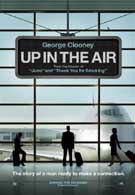“All the things you probably hate about traveling,” says George Clooney’s Ryan Bingham, “are warm reminders that I’m home.” Ryan is a man in constant motion, a man who sees people as sharks which, should they stop moving, will die. He refuses to die and so he lives in the air, flying from one city to the next, never stopping long enough to form attachments. He thinks of his life as a backpack, in which all the things you own and the people you know must go. His advice is: travel light. Refusing to be weighed down he avoids relationships and material possessions. He’s on the move. A lesser film would, in the end, demonstrate the flaw in this philosophy by forcing Ryan to fall in love. And in that other movie’s final moments the music would swell and Ryan would look into his dream girl’s eyes to discover that, in fact, he’s had it all wrong and it’s time to settle down. Up in the Air is not that movie.
Life is never really rom-com simple and so Ryan travels not because he needs fixed or because he’s running from something but because he genuinely loves being on the move. Director Jason Reitman lets us see that world through his eyes, a world in which airport terminals and hotel rooms form a shiny, friendly veneer of routine and comfort. In front of Reitman’s camera Ryan’s life is vibrant and alive, the clouds beneath his feet seem as if they leap out of the screen in brilliant blues and whites, the perfectly appointed hotel room is a miniature palace that’s all his just for one night. It’s the same feeling you get at the start of a perfect vacation; the feeling you get on your first drive down the Vegas strip, the view from the airport terminal in Honolulu as you land and look off into the distance imagining island adventure. Ryan skips the vacation and instead lives in a world of endlessly satisfying anticipation.
Living his life, however, comes with a price. Ryan is a corporate downsizing expert and when he lands in a new city it’s only to destroy someone’s life. He’s the guy your boss brings in when he’s afraid to fire you himself and Ryan takes his role seriously. In his own, strange way, he cares about the people he’s ruining. He’s good at his job, and knows it. He knows that they’re better off having him fire them than anyone else. Maybe he’s become numb to the specifics of the process but in his own way Ryan cares that if his job must be done, he’s there to make sure it’s done right.
Clooney’s performance as Ryan is layered and resonate. He’s quick with a wry smile but there’s something deeper and haunted in his eyes. He loves being up in the air and in his own way truly believes in his philosophy of traveling light. Yet he’s lost touch with the people he loves and in fact he’s so committed to his world of endless travel that it’s often as if the outside world doesn’t exist. Ryan lives a life in which the only connections he makes are the kind that get him from Louisville to Miami. As that starts to change something else awakens in him and we watch as he questions the philosophy that’s defined him for the better part of a lifetime.
But Up In The Air is more than just one great performance. It’s a film which exists as a product of our time, a movie with something to say about the people we are right now. The film’s most important moments take place on the ashes of American economic dominance. Ryan wanders through the crumbling streets of Detroit and makes the big decisions about his life in already empty office buildings, which, will only be emptier after he’s finished. And as he wanders the crumbling hallways of people who live the grounded life he’s avoided living for so long you can’t help but wonder if, unsustainable as it is, there’s a nugget of truth in his world view.
Up In The Air is without a doubt one of the year’s very best films from one of Hollywood’s very best young directors. It’s wonderfully acted and funny and poignant and all the things there are to love about the greatest films of American cinema. Oscar nominations are sure to abound, but what matters is what you take away from seeing it. Weigh the costs of the things you carry with you. Sometimes it’s better to travel light.












